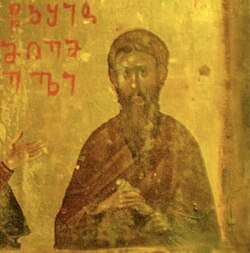Shio of Mgvime (Georgian: შიო მღვიმელი, romanized: shio mghvimeli; lit. 'Shio the caveman' or 'Shio of the Cave'[1]) (fl. 6th century) was an anchorite, desert father, thaumaturgus and one of the thirteen Assyrian apostles of the Georgian kingdom of Iberia. He is venerated as a saint who introduced the notion of a strict ascetic life to the Georgian Church.[2]
Shio of Mgvime | |
|---|---|
 | |
| Bishop, Preacher | |
| Born | Antioch, Byzantine Empire |
| Died | Mtskheta, Kingdom of Iberia |
| Venerated in | Georgian Orthodox Church Eastern Orthodox Church |
| Major shrine | Shio-Mgvime monastery |
| Feast | May 22 |
| Patronage | Georgia |
Life
editHe was born in Antioch. At the age of 20, he became a disciple of the famous hermit John of Zedazeni,[3] distributed his property to peasants and monasteries, and became a monk himself.[4] In the middle of the 6th century, he lived in Mtskheta. Monk Shio separated from his brethren and founded the Shio-Mgvime monastery on Sarkine mountain.[5][6] Initially, Shio lived in a small cave, which was converted into a church around the 9th century, the monastery became a large organization during the time of Shio.[7] On his own initiative, the first church named after John the Baptist was built here. Shio performed an extraordinary feats of endurance,[8] by spending the last years of his life in total seclusion, in a 12 metre deep cave,[9] he was buried there.[10] His feast day is on May 22.
References
editBibliography
edit- Rapp, S. H. Jr (2014) The Sasanian World through Georgian Eyes: Caucasia and the Iranian Commonwealth in Late Antique Georgian Literature, Ashgate Publishing, ISBN 978-1-4724-2552-2
- Soltes, O. (1999) National Treasures of Georgia, Bloomsbury, ISBN 978-0-85667-501-0
- Tchekhanovets, Y. (2018) The Caucasian Archaeology of the Holy Land: Armenian, Georgian and Albanian Communities Between the Fourth and Eleventh Centuries CE, ISBN 978-90-04-36555-1
- Charkiewicz, J. (2005) Gruzińscy święci, Warszawa: Warszawska Metropolia Prawosławna, ISBN 978-83-60311-87-5